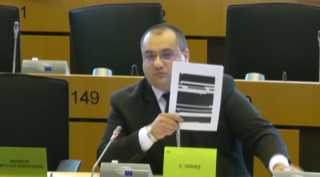Belgium, (Brussels Morning Newspaper) Jokingly, EPBD was nicknamed the European Putin Bashing Directive, while we negotiated the Energy Performance of Buildings Directive in the European Parliament last autumn. As it turned out the joke is on us.
According to European think tank Bruegel, EU countries transferred 140 billion euros to Russia in 2022. Payments for the import of Putin’s fossil energy leave a trail of blood deep into the battlefields of Ukraine.
Surely, the European Union managed to diversify its gas supply over the year, in large part to other authoritarian regimes. Yet, there are still no sanctions in place on gas supplies from Russia, which currently supplies well above 10 percent of EU gas imports. Instead, Russia cut flows to the EU. Decades after Russia asked us to enter, Putin made us crawl.
Enter energy efficiency. EU countries combined managed to save an impressive 19 percent in gas consumption in the period August 2022 – January 2023 compared to previous years. Gas savings were a critical part of the EU’s emergency response to the energy crisis, and might well have saved us from a rioting Europe. In the next few years however, Europe’s gas supply-demand balance will remain extremely fragile and exposed to external influences we cannot control: colder winters, low output from renewables, increased LNG demands in other parts of the world – or yet another authoritarian supplier, who decides to punish Europe.
But the energy we do not consume cannot be weaponized and turned against us, which is why Western security politics begs for an intense political focus on energy efficiency and its obvious advantages: energy efficiency reduces demand, puts less pressure on the electricity grid, and can be implemented much faster than we can deploy new wind and solar parks.
Or as the International Energy Agency puts it: “While there are many ways for countries to address the current crisis, focusing on energy efficiency action is the unambiguous first and best response to simultaneously meet affordability, supply security, and climate goals.”
In other words, we have nothing but good reasons to address energy efficiency with utmost seriousness. The necessary political focus is, however, nowhere in sight.
As we enter the final negotiations, the so-called trialogue, between the European Parliament, The European Commission, and the Council of the European Union, the Energy Performance of Buildings Directive is certain to meet deep national resistance over energy renovations of Europe’s building mass, which, mind you, accounts for more than 1/3 of Europe’s energy consumption.
Likewise, the EU, Norway, and the UK has allocated a staggering 750 billion euro to shield consumers from rising energy costs. It is a noble purpose with a dark downside: the majority of allocations are direct subsidies, which work to increase energy demand.
However, expert calculations demonstrate that if measures in the European Parliament’s position on the Energy Performance of Buildings Directive were effectuated, even with full utilization of the possible derogations, amounting to 22 percent of the building mass in each country, we would still save 47 billion cubic meter gas. That equals 3/4 of today’s gas imports from Russia.
When internationally renowned geopolitical magazine ‘Foreign Affairs recently provided a lengthy in-depth analysis of the turn of world events over the past 18 months, it rightfully highlighted energy policy’s new position as a high-level security policy instrument, and equally rightful pointed to solutions for designing the future energy systems with respect to the boosting of renewables and the protection of infrastructure. Energy efficiency was not mentioned in a single word.
It is like an echo of the past. I have been in energy politics since 2014, and as long as I can remember energy efficiency has appeared as some distant cousin in the policy room, present, but somehow positioned in a corner where its full potential never sees the light of day.
While energy efficiency appears unsexy and pales in comparison with a 300 feet tall windmill, another explanation may come closer to the reluctant implementation of energy efficiency measures. All countries derive taxes from energy consumption. Consequently, energy efficiency might be a red flag to Finance Ministers across Europe.
Yet, the only red flag of importance should be those concerning our security and climate targets. Energy efficiency is key to both, yet it is an underexploited political tool. It is, however, a potential nightmare for Putin, and if we are in the business of putting the joke back on him, energy efficiency needs to be put to better use across Europe as soon as possible.








